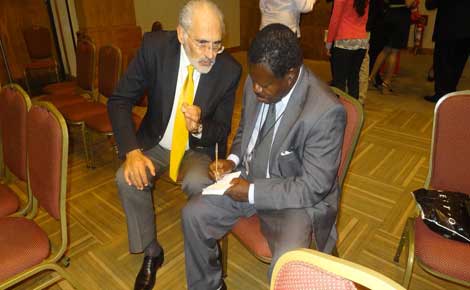 |
| Former Bolivian President Carlos Mesa talks to Standard Journalist, Joe Ombuor at the recently concluded Global Peace Convention in Asuncion,, Paraguay |
The sight of 14 former Latin American Presidents brought together by the desire to pool their experiences for better future leadership in a continent once synonymous with feudal systems was an unprecedented score for the 2014 sixth Global Peace Convention (GPC) in Asuncion, Paraguay.
For the African delegates present, the aptly named Latin American Presidential Mission was a marvel to behold as each of the 14 enunciated how they had individually contributed to improved democratic, economic and social well-being of their countries beyond inherent religious, political, social and other differences.